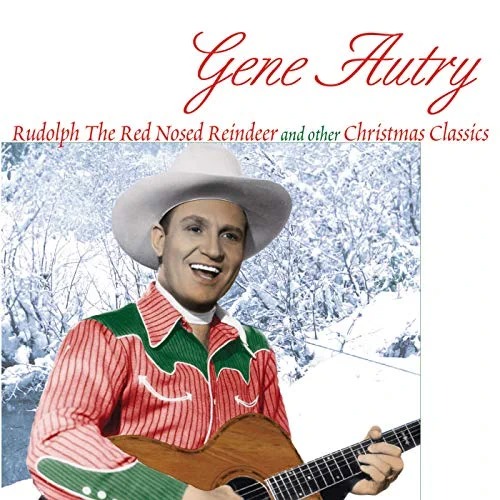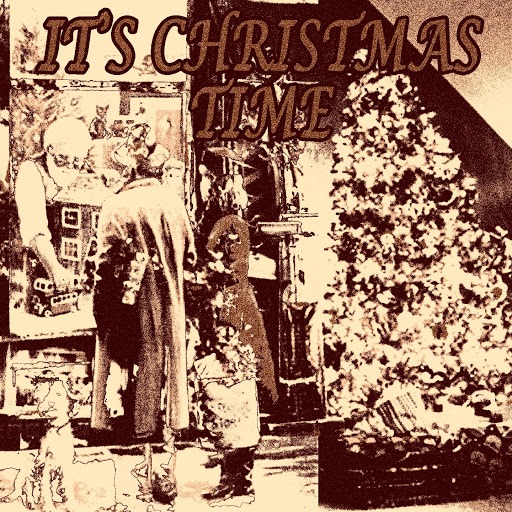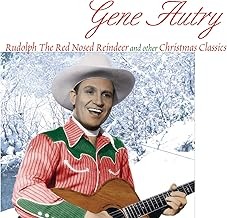Gene Autry Lyrics
Sorted by Album Release Date
(View Sorted by Song Title)
From the Album
1. Here Comes Santa Claus (Right Down Santa Claus Lane)
2. Rudolph the Red-Nosed Reindeer
3. Hes A Chubby Little Fellow
4. Santa Santa Santa
5. If It Doesnt Snow On Christmas Day
6. When Santa Claus Gets Your Letter
7. Frosty the Snowman
8. The Night Before Christmas Song
9. The Night Before Christmas (In Texas That Is)
10. Where Did My Snowman Go?
11. I Wish My Mom Would Marry Santa Claus
12. Sleigh Bells
13. Round Round the Christmas Tree
14. Merry Christmas Waltz
15. Everyone's a Child at Christmas (Single Version)
16. You Can See Old Santa Claus (When You Find Him In Your Heart)
17. Santa Claus Is Comin to Town
18. Up On The House Top (Ho Ho Ho)
From the Single
Rudolph the Red-Nosed Reindeer
From the Single Here Comes Santa Claus (Right Down Santa Claus Lane)
Other Songs A Year Ago Tonight Along the Navajo Trail At Mail Call Today Away In A Manger Away in the Manger Back In the Saddle Again Blueberry Hill Can't Shake the Sands of Texas from My Shoes Comin' in on a Wing and a Prayer Deep In The Heart of Texas Dont Fence Me In Ghost Riders In the Sky Girl of My Dreams Gone Fishin' Gonna Build A Big Fence Around Texas Harbor Lights Have I Told You Lately That I Love You Home On the Range (I Got Spurs That) Jingle, Jangle, Jingle I'm an Old Cowhand (From the Rio Grande) I'm Thinking Tonight of My Blue Eyes Im Thinking Tonight of My Blue Eyes (78rpm Version) In a Little Spanish Town It Happened in Monterey It Makes No Difference Now Jingle Bells Jingle Jangle Jingle Joy to the World Lonely River Mexicali Rose Nine Little Reindeer Nobody's Darling But Mine O Little Town of Bethlehem Peter Cottontail Red River Valley Ridin' Down the Canyon Room Full of Roses Rudolph The Red Nose Reindeer Rudolph the Red-Nosed Reindeer (78rpm Version) Ruldolf Santa Claus Is Coming to Town Silent Night Sioux City Sue Sleigh Bells (Single Version) Sleigh Ride Smokey the Bear Snowbird South of the Border (Down Mexico Way) That Silver-Haired Daddy of Mine The Last Roundup The Night Before Christmas The Old Rugged Cross The Riddle Song The Woodpecker Song Twilight on the Trail Up On The House Top Up On the Housetop (Ho Ho Ho) Vaya Con Dios Way Out West in Texas We Wish You A Merry Christmas What Child Is This? When Its Springtime In the Rockies When the Swallows Come Back to Capistrano You Are My Sunshine
From the Single Here Comes Santa Claus (Right Down Santa Claus Lane)
Other Songs A Year Ago Tonight Along the Navajo Trail At Mail Call Today Away In A Manger Away in the Manger Back In the Saddle Again Blueberry Hill Can't Shake the Sands of Texas from My Shoes Comin' in on a Wing and a Prayer Deep In The Heart of Texas Dont Fence Me In Ghost Riders In the Sky Girl of My Dreams Gone Fishin' Gonna Build A Big Fence Around Texas Harbor Lights Have I Told You Lately That I Love You Home On the Range (I Got Spurs That) Jingle, Jangle, Jingle I'm an Old Cowhand (From the Rio Grande) I'm Thinking Tonight of My Blue Eyes Im Thinking Tonight of My Blue Eyes (78rpm Version) In a Little Spanish Town It Happened in Monterey It Makes No Difference Now Jingle Bells Jingle Jangle Jingle Joy to the World Lonely River Mexicali Rose Nine Little Reindeer Nobody's Darling But Mine O Little Town of Bethlehem Peter Cottontail Red River Valley Ridin' Down the Canyon Room Full of Roses Rudolph The Red Nose Reindeer Rudolph the Red-Nosed Reindeer (78rpm Version) Ruldolf Santa Claus Is Coming to Town Silent Night Sioux City Sue Sleigh Bells (Single Version) Sleigh Ride Smokey the Bear Snowbird South of the Border (Down Mexico Way) That Silver-Haired Daddy of Mine The Last Roundup The Night Before Christmas The Old Rugged Cross The Riddle Song The Woodpecker Song Twilight on the Trail Up On The House Top Up On the Housetop (Ho Ho Ho) Vaya Con Dios Way Out West in Texas We Wish You A Merry Christmas What Child Is This? When Its Springtime In the Rockies When the Swallows Come Back to Capistrano You Are My Sunshine
The biggest selling country & western singer of the middle of the 20th century was born Orvon Gene Autry on September 29, 1907, in the tiny Texas town of Tioga, the son of Delbert and Elnora Ozmont Autry. He was first taught to sing at age five by his grandfather, William T. Autry, a Baptist preacher and descendant of some of the earliest settlers in Texas, contemporaries of the Houstons and the Crocketts (an Autry had died at the Alamo). The boy's interest in music was encouraged by his mother, who taught him hymns and folk songs and read psalms to him at night. Autry got his first guitar at age 12, bought from the Sears, Roebuck & Co. catalog for eight dollars (saved from his work as a hired hand on his uncle's farm baling and stacking hay). By the time he was 15, he had played anyplace there was to perform in Tioga, including school plays and the local cafe, but made most of his living working for the railroad as an apprentice at $35 a month. Later on, as a proper telegraph operator, he was making $150 a month, which those days was a comfortable income in that part of Texas.
His first recordings had just been released when his mother, who'd been ill for months, died at the age of 45, apparently of cancer. Autry's father began drifting away soon afterward, and he became the head of the family and the main supporter of himself, two sisters, and a younger brother. In early December of 1929, Autry cut his first six sides for ARC. The music was a mix of hillbilly, blues, country, yodel songs, and cowboy ballads. His breakthrough record, "That Silver-Haired Daddy of Mine," co-written by Autry and his friend Jimmy Long one night at the railroad depot, was released in 1931. The song sold 30,000 copies within a month, and by the end of a year 500,000 had been sold, an occasion that American Records decided to mark with the public presentation of a gold-plated copy of the record. Autry received a second gold record when sales later broke one million. And that was where the notion of the Gold Record Award was born. The record also led him into a new career on the radio as Oklahoma's Yodeling Cowboy on the National Barn Dance show sponsored by WLS out of Chicago. It was there that Autry became a major national star -- his record sales rose assisted by his exposure on radio.
By the early '30s, Autry became one of the most beloved singers in country & western music. By 1933, he was getting fan letters by the hundreds every week, and his record sales were only going up. Autry's career might've been made right there, but fate intervened again that year, in the form of the movie business. The Western -- especially the B Western, the bottom-of-the-bill, low-budget action oater -- had been hit very hard by the coming of sound in the years 1927 to 1929. Audiences expected dialogue in their movies, and most Western stars up to that time were a lot better at riding, roping, and shooting than reading lines. Not only did producers and directors need something to fill up the soundtracks of their movies, especially on the limited budgets of the B Westerns, but something to substitute for violent action, which was being increasingly criticized by citizen groups.
His first starring Western for the newly organized Republic Pictures, Tumbling Tumbleweeds (released on September 5, 1935), which also included the singing group the Sons of the Pioneers, was a huge hit, and was followed by Melody Trail, The Sagebrush Troubador, and The Singing Vagabond, all released during the final three months of 1935. Autry settled into a schedule of one movie every six weeks, or eight per year, at $5,000 per movie, and a formula was quickly established.
Autry's career was interrupted by his service in the military during World War II, but when he returned to the recording and movie studios in 1945, he resumed both his singing and film careers without skipping a beat. He was still a name to be reckoned with at the box office, although he was never again ranked among the top ten money-making stars of movies.
His singing career was bigger than ever, however. Even before the war, Autry had occasionally moved away from country music and scored big, as with his 1940 hit version of "Blueberry Hill," which predated Fats Domino's recording by 16 years. After the war, he still did cowboy and country songs such as "Silver Spurs" and "Sioux City Sue," sprinkled with occasional folk songs and pop numbers. In 1949, however, Autry scored the biggest single hit of his career -- and possibly the second- or third-biggest hit song ever recorded up to that time -- with "Rudolph the Red-Nosed Reindeer," a song by Johnny Marks that Autry had recorded only reluctantly, in a single take at the end of a session. That same year, he cut "(Ghost) Riders in the Sky," a number by a former forest ranger named Stan Jones, which became both a country and pop music standard, cut by everyone from Vaughan Monroe to Johnny Cash.
Gene Autry was more than a musician. His music, coupled with his careers in movies and on radio and television, made him a part of the American cowboy mythos. He defined country music for two generations of listeners, cowboy songs for much of the 20th century, and American music for much of the world. He was country music's first genuine "multimedia" star, the best-known country & western singer on records, in movies, on radio, and on television from the early 1930s until the mid-'50s. His 300 songs cut between 1929 and 1964 include nine gold record awards and one platinum record; his 93 movies saved one big chunk of the movie industry, delighted millions, and made millionaires of several producers (as well as Autry himself); his radio and television shows were even more popular and successful; and a number of his songs outside of the country & western field became American pop culture touchstones.
-Amazon Music -~ Bruce Eder
Birth Name: Orvon Gene AutryHis first recordings had just been released when his mother, who'd been ill for months, died at the age of 45, apparently of cancer. Autry's father began drifting away soon afterward, and he became the head of the family and the main supporter of himself, two sisters, and a younger brother. In early December of 1929, Autry cut his first six sides for ARC. The music was a mix of hillbilly, blues, country, yodel songs, and cowboy ballads. His breakthrough record, "That Silver-Haired Daddy of Mine," co-written by Autry and his friend Jimmy Long one night at the railroad depot, was released in 1931. The song sold 30,000 copies within a month, and by the end of a year 500,000 had been sold, an occasion that American Records decided to mark with the public presentation of a gold-plated copy of the record. Autry received a second gold record when sales later broke one million. And that was where the notion of the Gold Record Award was born. The record also led him into a new career on the radio as Oklahoma's Yodeling Cowboy on the National Barn Dance show sponsored by WLS out of Chicago. It was there that Autry became a major national star -- his record sales rose assisted by his exposure on radio.
By the early '30s, Autry became one of the most beloved singers in country & western music. By 1933, he was getting fan letters by the hundreds every week, and his record sales were only going up. Autry's career might've been made right there, but fate intervened again that year, in the form of the movie business. The Western -- especially the B Western, the bottom-of-the-bill, low-budget action oater -- had been hit very hard by the coming of sound in the years 1927 to 1929. Audiences expected dialogue in their movies, and most Western stars up to that time were a lot better at riding, roping, and shooting than reading lines. Not only did producers and directors need something to fill up the soundtracks of their movies, especially on the limited budgets of the B Westerns, but something to substitute for violent action, which was being increasingly criticized by citizen groups.
His first starring Western for the newly organized Republic Pictures, Tumbling Tumbleweeds (released on September 5, 1935), which also included the singing group the Sons of the Pioneers, was a huge hit, and was followed by Melody Trail, The Sagebrush Troubador, and The Singing Vagabond, all released during the final three months of 1935. Autry settled into a schedule of one movie every six weeks, or eight per year, at $5,000 per movie, and a formula was quickly established.
Autry's career was interrupted by his service in the military during World War II, but when he returned to the recording and movie studios in 1945, he resumed both his singing and film careers without skipping a beat. He was still a name to be reckoned with at the box office, although he was never again ranked among the top ten money-making stars of movies.
His singing career was bigger than ever, however. Even before the war, Autry had occasionally moved away from country music and scored big, as with his 1940 hit version of "Blueberry Hill," which predated Fats Domino's recording by 16 years. After the war, he still did cowboy and country songs such as "Silver Spurs" and "Sioux City Sue," sprinkled with occasional folk songs and pop numbers. In 1949, however, Autry scored the biggest single hit of his career -- and possibly the second- or third-biggest hit song ever recorded up to that time -- with "Rudolph the Red-Nosed Reindeer," a song by Johnny Marks that Autry had recorded only reluctantly, in a single take at the end of a session. That same year, he cut "(Ghost) Riders in the Sky," a number by a former forest ranger named Stan Jones, which became both a country and pop music standard, cut by everyone from Vaughan Monroe to Johnny Cash.
Gene Autry was more than a musician. His music, coupled with his careers in movies and on radio and television, made him a part of the American cowboy mythos. He defined country music for two generations of listeners, cowboy songs for much of the 20th century, and American music for much of the world. He was country music's first genuine "multimedia" star, the best-known country & western singer on records, in movies, on radio, and on television from the early 1930s until the mid-'50s. His 300 songs cut between 1929 and 1964 include nine gold record awards and one platinum record; his 93 movies saved one big chunk of the movie industry, delighted millions, and made millionaires of several producers (as well as Autry himself); his radio and television shows were even more popular and successful; and a number of his songs outside of the country & western field became American pop culture touchstones.
-Amazon Music -~ Bruce Eder
Born: September 29, 1907
Died: October 2, 1998
Parents: Delbert and Elnora Ozmont Autry



